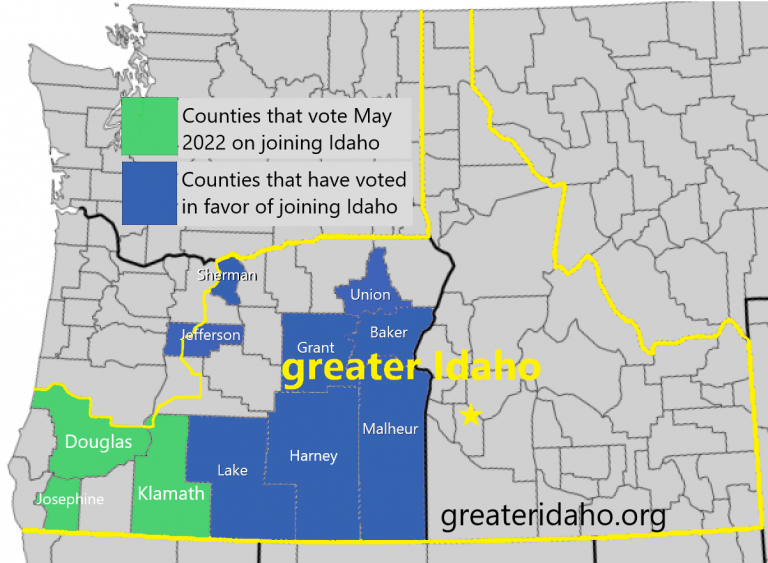Two out of three counties voting on the proposed annex rejected the jurisdictional transfer in early returns.

Courtesy of the Greater Idaho Movement
Oregonians in two counties appeared to reject a plan Tuesday to annex parts of Oregon into Idaho, while a third county supported the proposal.
The symbolic thumbs down came from voters in Douglas and Josephine counties, while voters in Klamath County backed the measure. The early results indicated the Greater Idaho movement has secured buy-in from slightly less than a majority of the counties outlined in its target areas across Eastern and Southern Oregon, which represents about three-quarters of Oregon’s landmass.
So far, nine counties of 19 in the proposed Idaho annex are on board with taking a closer look at how the land’s jurisdiction might be transferred from one state to another. Two more will vote on the question in November.
The idea is to move Idaho’s western border to include everything east of the Deschutes River excluding the City of Bend, including portions of Deschutes, Jefferson and Wasco counties, and everything south of Lane County.
The votes to approve in the nine counties are purely advisory, and it would take an act of both state legislatures and the blessing of the federal government to make it happen. The movement is two years into its effort, but the feasibility of altering both states remains unclear.
Sherman, Grant, Union, Baker, Jefferson, Harney, Malheur and Lake counties previously approved measures supporting Greater Idaho. Organizers collecting signatures recently gained enough to qualify for the November ballot in Morrow County and are still gathering signatures to get it on the ballot in Wallowa County.
Proponents of the movement say Oregonians in more rural parts of the state would be better represented in Boise than Salem due to the politics of each state.
Laws passed in recent years by the Democratic supermajority-led Oregon Legislature have often drawn the ire of rural residents, such as increased business taxes, environmental regulations aimed at fighting climate change and overtime pay for farmworkers.
“This is not a political movement, this is a values movement,” said Mike McCarter, La Pine resident and president of the nonprofit group backing Greater Idaho. “It’s an urban-rural clash.”
The area outlined in the move represents approximately 900,000 people and voted 61% in favor of former president Donald Trump in the 2020 election. Oregon’s current total population is 4.1 million and went 56% in favor of President Joe Biden.
McCarter points to political violence in Portland and a perceived increase in crime as two major issues that many rural Oregonians disagree with. He also believes the state is mismanaging its natural resources and needs to harvest more timber to help create healthy forests.
In Idaho, Rep. Barbara Ehardt, R-Idaho Falls, believes the 19 counties joining her state would be an excellent addition. She notes that Greater Idaho would have a deep-water port in Coos County that could be hugely beneficial to the state’s economy. She also sees an opportunity to mine for precious minerals in Oregon’s southeastern corner.
“The fact that we deregulate things could mean huge benefit, not just to Oregonians and Idahoans, but all the people in the surrounding area with whom we trade,” Ehardt said. “We’d be bringing in like-minded people who support the same freedoms.”
As the chair of the Idaho Legislature’s House committee on energy, environment and technology, Ehardt held a joint hearing on Greater Idaho during the 2021 session. She said it was well-received by many of her colleagues, but it will take some further convincing for the Idaho Legislature to understand the financial implications of taking on the large swath of Oregon.
“There are some concerns about whether we’d have to subsidize (these counties),” Ehardt said. “But if they were under Idaho regulations, imagine how much more vibrant things would be because they won’t be so restricted.”
In Oregon, only a handful of lawmakers — mostly from the eastern half of the state — are vocal about their support for the movement.
Oregon House Speaker Dan Rayfield, D-Corvallis, declined to comment on whether the movement would receive a hearing should it be approved.
Rep. Lily Morgan, R-Grants Pass, declined to comment as well, saying she didn’t want to influence the outcome of the vote.
Two other lawmakers in counties where the question was on the primary ballot did not respond to a request for comment.
For the antidote to media bias, check out ProTrumpNews.com!
The post Greater Idaho proposal faces friction in early results Tuesday appeared first on Citizen Free Press.
